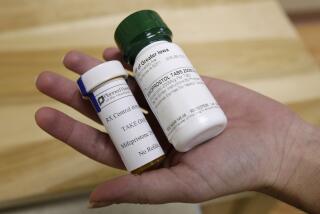Patients beware: All FDA-approved drugs not created equal
- Share via
U.S. consumers might put a little too much faith in the FDA’s role as a gatekeeper for marketable drugs, according to a new study -- but giving patients a little bit of information about such drugs can actually help people make better treatment choices.
For the study published Monday in the Archives of Internal Medicine, two researchers surveyed 2,944 people and tested which hypothetical cholesterol drug they would choose: one that had a “patient outcome” (reduced heart attacks) or one that only had a “surrogate outcome” (lower cholesterol).
Patients would probably be better off choosing the first, more “proven” drug, assuming they understood that the first drug was less risky than the second.
To test their choices, the researchers divided the participants into three groups. One group was told only what the drugs did. A second group was given the same information but also warned that it wasn’t clear that the second drug helped patients “feel better or live longer.” A third group got the information, the warning and was told to “ask for a drug shown to reduce heart attacks.”
Sure enough, the researchers found that 71% of each of the two “informed” groups chose the first drug, the better option. But only 59% of the first group, which was given no guidance, chose the better drug.
Another experiment involving heartburn drugs (in which the preferable drug had been on the market eight years while the other drug had been commercially available for only one year) showed similar results.
The problem seemed to be that people mistakenly assumed all drugs on the market were very safe, having passed the FDA’s standard.
Indeed, the study showed that most people thought the FDA-approval bar was set a little higher than in reality -- 39% thought the FDA approves only extremely effective prescription drugs, 25% believed that only extremely effective drugs can be advertised, 25% thought the FDA approves only drugs without serious side effects and 17% thought that drugs with serious side effects can’t be advertised.
A full 56% believed at least one of these mistaken ideas.
A little education to improve patients’ decisions may be in order. But in an accompanying commentary, Dr. Michael A. Steinman of the San Francisco VA Medical Center wrote that “seemingly irrational decisions persisted to a striking degree. One in 3 participants preferred a drug with no evidence of clinical benefit despite explicit instructions to ask for a drug known to confer benefit (and no discernible reason to favor the inferior drug).”
Doctors, those entrusted with advising patients, were often just as guilty of irrationality, Steinman added.
“It’s not only patients who make such illogical decisions,” Steinman continued. “Physicians are equally well established in our proclivity to favor new, relatively untested medications and to prescribe contrary to guidelines.”
Follow me on Twitter @LAT_aminakhan.







